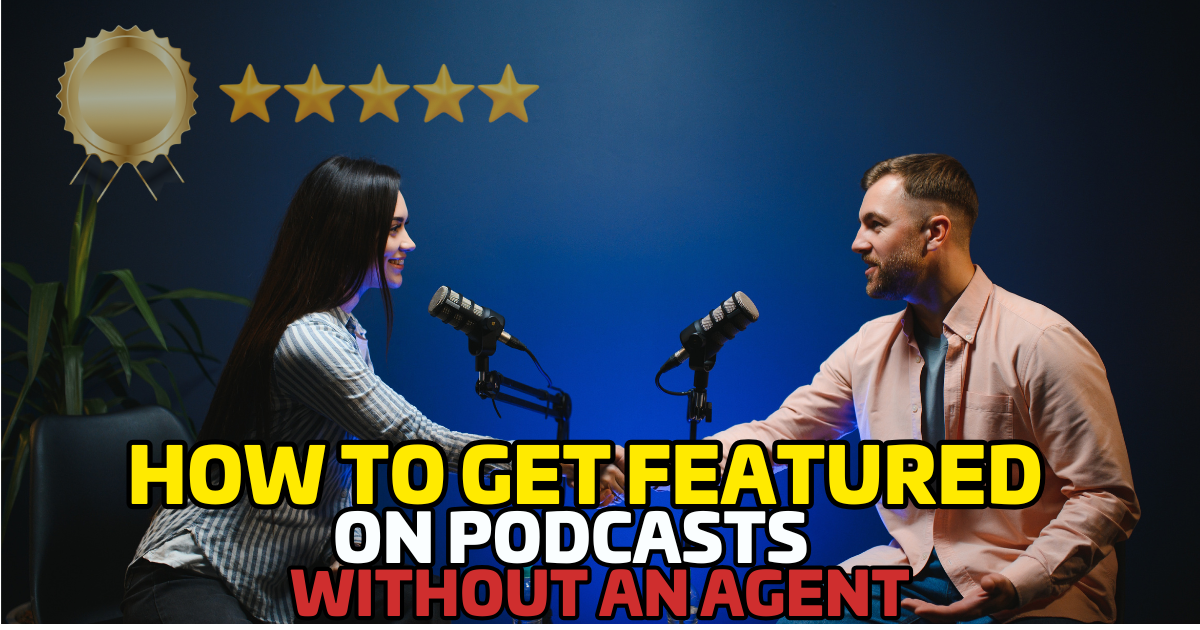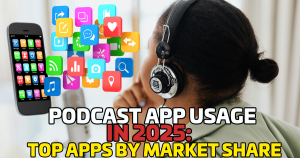Podcasts are one of the fastest-growing platforms for entrepreneurs, coaches, and CEOs to build authority, connect with new audiences, and establish themselves as thought leaders.
Yet, many people assume they need a podcast booking agent to land interviews on the right shows.
Here’s the truth: you can absolutely get featured on podcasts without an agent, if you know the right strategies.
While working with an agency like Command Your Brand can streamline the process and get you on top shows faster, many experts start by booking themselves.
This guide will show you how to identify the right podcasts, craft compelling pitches, and build long-term relationships with hosts, all without paying for an agent.
And if you want to learn how to take things further, check out our in-depth article: How to Get Booked on Top Podcasts as a Founder or CEO.
Why Podcast Guesting Works (With or Without an Agent)
Before we dive into the tactics, let’s explore why podcasts are such a powerful platform for thought leadership and business growth.
1. Direct Access to Engaged Audiences
Podcast listeners are loyal. Studies show that the majority listen to entire episodes and trust the hosts they follow.
Appearing as a guest means you’re being introduced to a highly engaged, niche audience.
2. Long-Form Authority Building
Unlike short social media clips or quick interviews, podcasts allow you to tell your story in-depth.
This creates trust and positions you as a true expert.
3. Evergreen Content
Podcast episodes live online for years, continuing to bring new listeners, leads, and opportunities long after the recording.
4. SEO Benefits
Many shows include guest bios, backlinks, and transcripts on their websites.
These provide valuable SEO authority, boosting your own website’s visibility.
Step 1: Define Your Message and Niche
The first step to booking podcasts without an agent is clarity.
Hosts don’t just want a random guest, they want someone with a clear, unique message that resonates with their audience.
Ask yourself:
- What’s my core expertise?
- What problem do I solve for my audience?
- What unique perspective can I offer compared to others in my industry?
Example:
If you’re a fitness coach, instead of pitching “general health tips,” focus on a niche like “helping busy CEOs stay fit without hours in the gym.”
A strong, defined niche makes it much easier for podcast hosts to say yes to your pitch.
Step 2: Build a Podcast Guest One-Sheet
A one-sheet is like your “resume” for podcast guesting.
It gives hosts everything they need to quickly evaluate you as a potential guest.
Your podcast one-sheet should include:
- A professional headshot
- A short bio (100–150 words) highlighting your expertise
- Suggested interview topics/questions
- Links to your website and social media
- Past media appearances (if any)
Even if you’re just starting, a well-crafted one-sheet instantly elevates your credibility.
Step 3: Research the Right Podcasts
One of the biggest mistakes DIY guests make is pitching to the wrong shows.
Instead of chasing every podcast under the sun, target ones that align with your goals.
Where to Find Podcasts:
- Apple Podcasts & Spotify: Browse by category relevant to your niche.
- Listen Notes: A search engine specifically for podcasts.
- Podchaser: A “LinkedIn for podcasts” with reviews, ratings, and guest history.
- Social Media & Communities: Hosts often promote their shows in LinkedIn groups, Facebook communities, or X threads.
How to Choose the Right Shows:
- Audience size (you don’t need the biggest shows, niche is better).
- Active publishing schedule (avoid inactive shows).
- Relevance to your expertise and ideal audience.
Remember: 10 targeted shows are better than 100 random ones.
Step 4: Craft a Personalized Pitch
This step is where most people fail. A generic copy-and-paste pitch won’t work.
Podcast hosts receive dozens of requests weekly, your message needs to stand out.
Anatomy of a Great Podcast Pitch:
- Personalized Introduction
Show that you’ve actually listened to their podcast. Reference a specific episode or insight. - Why You’re a Fit
Connect your expertise to their audience’s needs. - What You’ll Talk About
Include 2–3 suggested interview topics. - Social Proof
Mention past media or unique credibility markers. - Clear Call to Action
Invite them to book you or connect for more info.
Example Pitch:
Hi [Host Name],
I loved your recent episode with [Guest] on [Topic], especially your point about [specific takeaway]. It sparked an idea I think your audience would love.
I specialize in helping [your audience] achieve [specific result], and I’d love to bring that perspective to your show. Some potential topics include:
- [Topic Idea #1]
- [Topic Idea #2]
- [Topic Idea #3]
I’ve been featured on [media outlet/podcast] and would be honored to contribute to your show.
Would you be open to discussing a guest spot?
Best,
[Your Name]
Step 5: Leverage Your Network
Don’t underestimate the power of introductions.
If you know someone who’s been on a podcast, ask them to connect you with the host.
Other ways to leverage connections:
- Join mastermind groups or networking communities.
- Engage with podcast hosts on LinkedIn or Instagram.
- Comment on and share their content before pitching.
Building genuine relationships makes the pitching process much easier.
Step 6: Prepare to Be a Great Guest
Landing the interview is only half the battle.
The other half is delivering massive value during your guest spot.
Best Practices for Being a Memorable Guest:
- Do Your Homework: Listen to at least 2-3 past episodes.
- Share Actionable Insights: Give the audience something practical they can apply.
- Tell Stories: People remember stories more than facts.
- Avoid Over-Selling: Focus on value; the trust will naturally lead to opportunities.
- Have a Call to Action Ready: Offer a free guide, quiz, or resource that ties back to your website.
Step 7: Repurpose and Promote Your Podcast Appearances
One of the biggest missed opportunities is failing to leverage podcast appearances after they go live.
Here’s how to maximize each interview:
- Share clips on LinkedIn, Instagram, and X.
- Turn transcripts into blog posts.
- Add logos of podcasts you’ve been on to your website.
- Use episodes in email nurturing campaigns.
This not only builds credibility but also makes future podcast pitches more successful.
Step 8: Track and Refine Your Outreach
Just like any business strategy, booking yourself on podcasts requires consistency and improvement.
Keep a simple spreadsheet of:
- Shows pitched
- Status (pending, accepted, declined)
- Dates scheduled
- Links to published episodes
Over time, you’ll learn which pitches resonate, which topics get the best response, and how to streamline the process.
When to Consider Hiring an Agency
While booking podcasts yourself is absolutely possible, there comes a point when outsourcing saves you time and accelerates results.
A professional agency like Command Your Brand:
- Has existing relationships with top podcast hosts.
- Crafts customized pitches that get results.
- Ensures you appear on shows that drive ROI.
- Helps with strategy, positioning, and repurposing content.
If your time is better spent running your business rather than managing outreach, partnering with an agency may be the best next step.
You don’t need an agent to start landing podcast interviews.
With the right niche, a strong one-sheet, personalized pitches, and consistent follow-up, you can build authority and expand your reach through podcast guesting.
But if you’re ready to take things to the next level and want to appear on top-ranked podcasts faster, check out our detailed guide: How to Get Booked on Top Podcasts as a Founder or CEO.
At Command Your Brand, we specialize in helping founders, CEOs, and experts like you land interviews on the right podcasts, so you can grow your authority, audience, and business without the trial and error.
👉 Ready to make podcasts your most powerful PR tool? Book a strategy call with Command Your Brand today.




